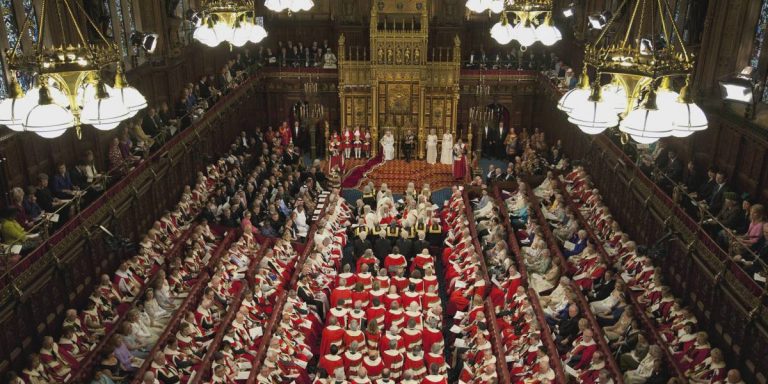The House of Lords is strange for a number of reasons. Its existence is within a twilight, a sort of half-accountable legislative body that takes a backseat publicly, with its spaces filled with people we’ve never heard of, nor people many of the British public particularly care about.
But with the latest Dissolution Honours, it is even more pressing that we tackle the rampant, pathetic cronyism that has turned our second chamber from a relatively good idea to a social club, full of hangers-on with big bank accounts, sullied ex-politicians and foreign lobbying individuals whose vested interest prevents them from being useful within the legislature.
On the surface, the idea of ex-MPs getting peerages might not seem such a bad idea. After all, it’s perhaps better that someone who knows the system, like if an ex-shadow and Health Minister becomes a Lord than someone who is a comparative outsider. When delved into even slightly, one finds that the conflict of interests that infest some of their lives as prospective law-approvers astounding.
Let’s take Andrew Lansley as an example: if the House were looking for a well-established member of society with political experience, he’d be great, right? Well, if the core remit of the Lords is to, without overriding personal interest, amend bills so they are better suited to fit into law, Lansley – putting it nicely – isn’t the best. It has emerged that not only did he receive donations exceeding £20,000 from the chairman of private healthcare group Care UK, John Nash: his wife is a founder of Low Associates, who have given “strategic policy advice” to SmithKline Beecham, part of one of the biggest pharmaceutical groups in the world. In short, this makes his capacity to be a fair law amender without vested interest completely compromised.
However, Lansley’s potentially compromised role is a grain of sand in the desert that has an endemic problem with close personal ties to various lobbying organisations. Another prospective member whose ties are exemplary in explaining the problem within the Lords is Stuart Polak. Those unfamiliar with Polak should be worried, because Mr. Polak is CEO of a group called the Conservative Friends of Israel. According to their own website, eighty per cent of Tory members of the House of Commons are also members of the CFI, including another Conservative MP to receive a Lordship, Mr William Hague, former Conservative foreign secretary. It was alleged in a Dispatches documentary in 2009 that donations “from all CFI members and their businesses add up to well over £10m over the last eight years”. The CFI disputes this. Nevertheless, the film also alleged that William Hague also took thousands of pounds in personal donations from board members of the CFI, and that Hague and Cameron were both silenced when a donor was outraged when Hague called “elements” of Israel’s attacks of Gaza “disproportionate”.

If the Jewish Chronicle is correct even slightly in its assertion that Stuart Polak “leaves the group in a position of undeniable strength as the largest of parliament’s lobby groups” [3], then the fact that both Polak and Hague are becoming law-amenders is seriously worrying. If a Middle Eastern foreign policy bill comes to the Lords and is influenced by people who have direct, ideological and financial links to Israel, how is it guaranteed that Hague, Polak and others won’t use their power for their own personal, vested interests?
The list goes on. James Lupton was a massive Tory fundraiser, bankrolling the Tories war chest in recent elections. His donations to the Conservative Party, according to The Mirror, totalled £2,589,835 since 2009. People who have spent years bankrolling a single party and defending their own interests cannot possibly have the public at heart when considering new laws. Michelle Mone, Ultimo bra tycoon, is also up for a peerage: during the London riots, she tweeted that “People who riot, steal, cover face deserve zero human rights”, and was also forced to pay compensation to an employee at MJM International after placing “a bug in a flower pot”.
Perhaps SNP MP Stewart McDonald, who represents Glasgow South, puts it best. He said on Twitter, according to The Telegraph: “Yes, Michelle Mone is a successful entrepreneur, but to become a national legislator overnight without the fuss of an election is obscene.” The fact is, that whilst Mone’s business acumen may make her a good consultant to a Lord, her Tory leanings and complete lack of experience in a legislative arena make her far from the perfect candidate.
She, like many others that have been mentioned in this piece, are in the Lords for one reason. Money. The majority of the dissolution honours list is a big two fingers to democracy. Unelected individuals who have bankrolled political campaigns, and lobbied ferociously for the vested interests of themselves and the individuals within the organisations they represent should not be Lords. The British people don’t seem to be feeling the benefit of a Conservative government. But from the dissolution honours, at least we have a better idea of who will profit from this government. Namely its closest supporters, its money men and more worryingly, pressure groups promoting foreign powers with questionable foreign policy.
Some of the coverage you find on Cultured Vultures contains affiliate links, which provide us with small commissions based on purchases made from visiting our site. We cover gaming news, movie reviews, wrestling and much more.



